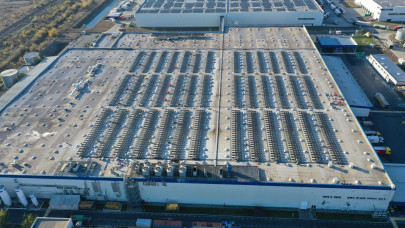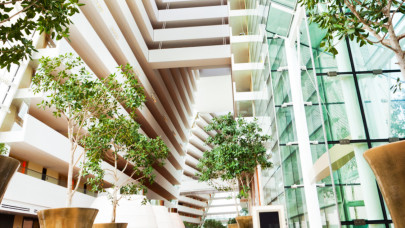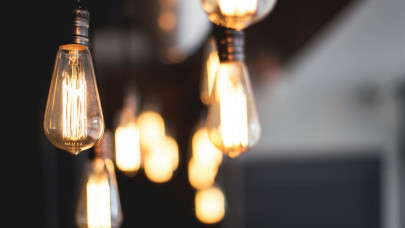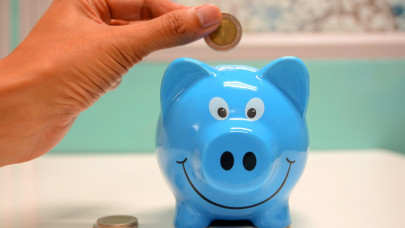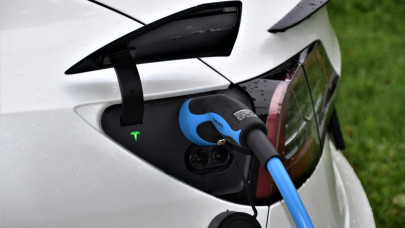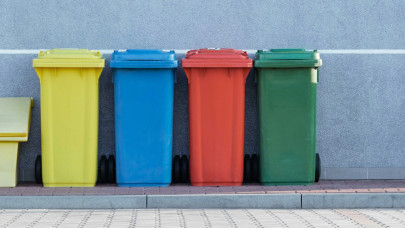PepsiCo has made significant commitments to sustainability, including its "PepsiCo Positive" vision. How does Pepsi Romania align with this global sustainability strategy, and what specific actions or initiatives has the company implemented locally to reduce environmental impact and promote social responsibility?
At PepsiCo, we understand that a sustainable food system leads to improved outcomes for both people and the planet. Since the launch of pep+ (PepsiCo Positive) in September 2021, we've been committed to implementing a strategic, end-to-end business transformation with sustainability at the center. Our focus is on three key pillars: Positive Agriculture, Positive Value Chain, and Positive Choices.
As part of our Positive Agriculture agenda, we're driving adoption of regenerative agricultural practices, a key part in our journey toward achieving net-zero by 2040. Concurrently, we're actively fostering a circular and inclusive value chain, committing to include recycled content in all packaging by 2030. We are also supporting a critical sustainability project known as the Deposit Return Scheme, almost complete localization of the product portfolio for the Romanian market (over 95%), invested in Photovoltaic (PV) panels in all our sites, as well as electrified transportation solutions.
Since launching our pep+ strategy in 2021, we've met several goals ahead of schedule — including our 2025 operational water-use efficiency target — and made significant progress on others. However, aspects of our pep+ agenda, such as climate and packaging, still require ongoing efforts. We strongly believe that the long-term success of our company is intrinsically linked to a healthy planet, resilient food systems, and the holistic well-being of our people and the communities we serve. Therefore, we will continue to pursue our global goals.
Romanians are increasingly seeking healthier food and drink options, a demand to which PepsiCo is responding. In 2021, we announced our plan to reduce added sugars in our soft drinks by 50% by 2030 in the EU. Additionally, we are committed to building a $1 billion portfolio of healthier snacks by the end of the decade. We are also using healthier oils, promoting baked products, and introducing sugar-free drinks.
What plans to develop the sustainable component does Pepsi Romania have for 2024?
We've established ambitious sustainability targets as part of pep+. Our commitments include: a 30% reduction in water use by 2030, incorporating recycled content in all packaging by 2030, a 50% increase in plant-based protein by 2025, a 20% reduction in added sugars in beverages by 2025, and providing 10 million people with access to nutritious food by 2030.
We announced a $13 million investment in a state-of-the-art, fully automated production line located in our beverage plant in Dragomirești.
This production line is considered the most automated in PepsiCo's European portfolio, capable of remarkable performance by producing up to 1 million bottles per day. It boasts a 30% reduction in energy consumption compared to conventional lines, with 30% higher energy efficiency per liter of product. The new line also increases beverage production by 60% per unit of time, using 20% less carbon dioxide and reducing water consumption by 30% per liter of beverage produced. Simultaneously, it contributes to a decrease in plastic usage by approximately 30 tons per year.
We also invested $100 million to double the production capacity at our Popesti-Leordeni snacks factory, making it a pivotal European hub. With three new production lines and an automated warehouse, resources efficiency is at the core of this project.
Part of the same investment plan, we are also investing $4 million into our Popesti Leordeni snacks factory, building the capability to produce our iconic Cheetos brand locally. This completes our snacks localization efforts, leading to 100% local production by the end of 2024. This investment also enables more than 40% energy reduction in the manufacturing process of our extruders. Moreover, our high-bay automated warehouse, launched this July, with its state-of-the-art auto-palletizer system, will concentrate all our operations in our Popesti site, bringing efficiencies, as well as eliminating redundant moves, with a direct contribution to environmental impact reduction.
What are your plans for green energy investments in 2024?
As part of the pep+ (PepsiCo Positive) PepsiCo Romania successfully transitioned 80% of its fleet to hybrid vehicles last year. This move contributed significantly to reducing the company's carbon footprint, with a fleet consisting of nearly 450 Toyota Corolla and Toyota Yaris hybrid cars, showcasing efficiency in reducing CO2 emissions.
We recently installed solar panels at three sites in Romania, and by the end of 2024 we will install PV panels on the top of our Popesti snacks automated warehouse. This will enable the building to become more sustainable from an electricity consumption perspective. Moreover, surplus energy generated will be directed to the production lines, making the entire Popesti ecosystem even more sustainable. This effort supports our pep+ goals and our goal to achieve net-zero emissions by 2040.
Additionally, we have introduced our first electric truck, the Volvo FM Electric 4x2, to our fleet. The truck, which supports our snack plant in Popești-Leordeni, combines energy efficiency, versatility, and quiet operation, reflecting our dedication to adopting advanced, sustainable technologies. We will continue investing in energy-efficient solutions, hybrid and electric vehicles, and other sustainable practices to help reduce our environmental impact and improve operational efficiency.
PepsiCo has set ambitious targets to reduce plastic waste and increase recycled content in its packaging. Can you share insights into Pepsi Romania's progress towards achieving these goals, as well as any innovative packaging solutions or recycling initiatives being implemented in the local market?
PepsiCo Romania is making significant strides in its sustainability efforts, aligning with global goals to reduce plastic waste and increase recycled content in packaging. Our initiatives aim to make all packaging in Romania recyclable, compostable, biodegradable, or reusable by 2025. We're actively investing in projects to boost recycling rates and emphasizing reusable models for a significant portion of beverage servings while exploring bio-based materials to reduce reliance on virgin plastic. We are committed to achieving 50% recycled content in plastic packaging by 2030.
As part of our sustainability efforts, we have introduced an innovative process to reduce energy consumption in PET bottle production. By changing the composition of recycled PET (rPET) preforms, electricity use during the blowing process has been reduced by up to 25%. This innovation enhances plastic recyclability and minimizes our carbon footprint. The improved rPET composition ensures uniform material distribution, boosting efficiency, productivity, and quality control. It also reduces material yellowing, maintaining bottle clarity and extending lifespan. These advancements support sustainability goals and promote a circular economy by improving plastic recycling.
Additionally, the Romanian Deposit-Return System that we support is a testament to the industry's commitment to transforming packaging waste management. This collaborative initiative, involving beverage manufacturers, retailers, and consumers, holds the potential to revolutionize Romania's approach to packaging and waste disposal. We also converted to tethered bottle closures in Romania, aiming to identify the best closure designs that adhere to EU guidelines while enhancing the consumer experience.
How does Pepsi Romania collaborate with suppliers, customers, government entities, and non-profit organizations to address shared environmental and social challenges, foster innovation, and promote sustainable practices throughout the value chain?
We actively collaborate with local farmers, helping to drive adoption of sustainable, regenerative farming practices to enhance soil health, minimize pesticide usage, and optimize irrigation. Through PepsiCo's global Positive Agriculture Outcomes (PAO) Accelerator program, our team is providing co-investments to support positive agriculture projects and innovative technologies.
In partnership with non-profit organizations and government entities, PepsiCo Romania addresses a range of challenges, including waste reduction, natural resource conservation, and community education. These collaborations reflect our commitment to promoting responsible practices across agriculture and our entire value chain.
Within the realm of packaging and recycling, we work closely with suppliers to develop sustainable packaging solutions. This involves initiatives to reduce plastic consumption, increase recycled content, and pioneer innovations in packaging materials.


